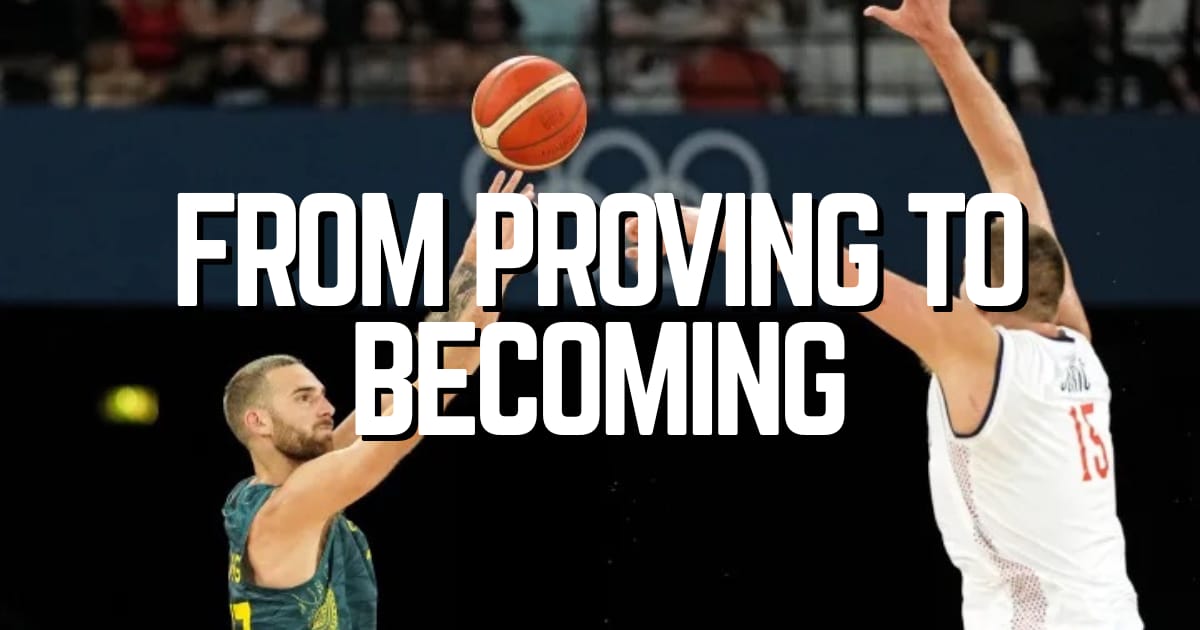In the NBA, I started getting worse.
Not physically — my body was fine.
But mentally, I was falling apart.
Shots stopped dropping. Confidence collapsed. I overthought everything.
It wasn’t new.
It happened in college.
It happened early in my pro career.
And now, it was happening again.
The Mirror Moment
One day before a game, I looked in the mirror — and what looked back was a scared kid.
I knew I needed help.
I thought success would fix that feeling.
Winning an NBL championship.
Going to the Olympics.
Playing in the NBA.
Each milestone was supposed to prove I was good enough.
But here I was, sitting in an NBA locker room, feeling worse about myself than I had twelve months earlier.
The Story Beneath the Story
I started working with a performance coach. Together, we went deep.
What we found was simple, but uncomfortable:
My career had been fueled by a prove-it mindset.
Since childhood, my inner story was: “I’m good at basketball — but no one else thinks I am.”
It fueled me for years.
When I was cut from teams, it lit a fire.
When people doubted me, I trained harder.
But it also carried a cost.
First: what I believed others thought of me was made up.
I had no proof. The belief that “they don’t think I’m good enough” was actually my own subconscious belief projected outward.
They might’ve believed in me.
But my story left me isolated, fighting imaginary battles alone.
Second: I depended on opportunities to feel worthy.
If I didn’t get minutes or reps, I felt anxious — desperate for a chance to prove myself.
In the NBA, where opportunities are scarce, that mindset turns toxic fast.
Frustration builds.
Doubt creeps in.
And when the chance finally comes, you’re so desperate to prove your worth that you forget how to just play.
That was me.
Trying to prove instead of perform.
And when I’m not me — I mess up badly.
Rewriting the Story
Awareness changed everything.
I began rewriting the story I told myself:
I am enough.
I do belong.
Others see my value.
Others want me here.
And here’s the thing — once you hold a belief, your subconscious looks for proof.
It’s called confirmation bias.
Suddenly, I started noticing support everywhere.
Encouragement from coaches.
Respect from teammates.
Moments that reinforced belonging instead of doubt.
A New Motivation
The next question was: Why do I play?
If it’s not about proving I’m good enough, then what’s the fuel?
I tested ideas — family, love for the game, or just to have fun.
I journaled. Sat in silence. Talked it through.
After months, I found my answer:
To test what I’m capable of becoming.
How disciplined can I be?
How confident?
How clutch?
How much can I learn?
Basketball became the arena for self-discovery.
A tool to see how far I could push my limits.
That shift reignited something deeper — curiosity instead of desperation.
Six Months Later
I’ve been showing up every day with that new story.
I belong.
I am valued.
I’m using this game to test myself.
I feel lighter.
I’m enjoying basketball again.
I’m having fun.
I’m playing with confidence.
When you stop playing to prove you belong, you finally start playing like you do.

